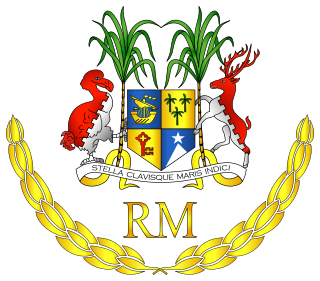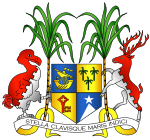
Politics of Mauritius takes place in a framework of a parliamentary democracy. The separation of powers is among the three branches of the Government of Mauritius, namely the legislative, the executive and the Judiciary, is embedded in the Constitution of Mauritius. Being a Westminster system of government, Mauritius's unicameral house of parliament officially, the National Assembly, is supreme. It elects the President and the Prime Minister. While the President is voted by a single majority of votes in the house, the Prime Minister is the MP who supports a majority in the house. The President is the Head of State while the prime minister has full executive power and is the Head of Government who is assisted by a council of Ministers. Mauritius has a multi-party system. The Economist Intelligence Unit rated Mauritius a "full democracy" in 2022.

Sir Anerood Jugnauth, GCSK, PV, was a Mauritian statesman, politician and barrister who served both as President and Prime Minister of Mauritius. He was Member of Parliament for Piton & Riviere Du Rempart. A central figure of Mauritian politics in the 1980s and 1990s, he was Leader of the Opposition from 1976 to 1982. He served four consecutive terms as prime minister from 1982 to 1995 and again from 2000 to 2003. He was then elected as President from 2003 to 2012. Following his party's victory in the 2014 general elections, he served his sixth and final term as prime minister, becoming the nation's longest serving prime minister with more than 18 years of tenure, overtaking Seewoosagur Ramgoolam, who held the office for 14 years.

Paul Raymond Bérenger is a Mauritian politician who was Prime Minister of Mauritius from 2003 to 2005. He has been Leader of the Opposition on several occasions – from 1983 to 1987, 1997 to 2000, 2005 to 2006, 2007 to 2013, October 2013 to 15 September 2014, and again from December 2014 to December 2016 when he was replaced by Xavier-Luc Duval. Following his party's defeat in the 2014 general elections, he became Leader of the Opposition for the sixth time, making him the longest ever to serve in this constitutional position. He was also deputy prime minister from 1995 to 1997 and again from 2000 to 2003, and he was a cabinet minister in the government of Anerood Jugnauth in 1982 and 1991. Bérenger, a Christian of Franco-Mauritian descent, has been the only non-Hindu prime minister of Mauritius, or, more particularly, the only prime minister who has not belonged to the Jugnauth or Ramgoolam families.

The President of the Republic of Mauritius is the head of state of the Republic of Mauritius. Mauritius is a parliamentary republic, and the president functions as a ceremonial figurehead, elected by the National Assembly as set out by the Constitution of Mauritius. The current office-holder is Prithvirajsing Roopun. He took the office on 2 December 2019. The president's official residence is the State House.

Sir Seewoosagur Ramgoolam, often referred to as Chacha Ramgoolam or SSR, was a Mauritian physician, politician, and statesman. He served as the island's only chief minister, first prime minister, and fifth governor-general.

Since 1967, Mauritius has experienced 13 free and fair democratic general elections to choose a government.

Navinchandra Ramgoolam is a Mauritian politician and doctor serving as prime minister of Mauritius for the third time following the 2024 general election, after the landslide victory of his coalition Alliance du Changement. He is a prominent figure in the political history of Mauritius, having served multiple terms as the Prime Minister of the country. He is also the leader of the Labour Party.

The Militant Socialist Movement is a centre-left political party in Mauritius. It was the single largest political party in the National Assembly of Mauritius, having won 42 of the 69 seats in the 2019 general elections; however, following the 2024 election, it only possesses one seat. It also holds the largest number of seats in all city/town councils through the country with 60 councillors out of 120. The party tends to be more popular amongst Indo-Mauritians.

The prime minister of Mauritius is the head of government of Mauritius. He presides over the Cabinet of Ministers, which advises the president of the country and is collectively responsible to the National Assembly for any advice given and for all action done by or under the authority of any minister in the execution of his office.

The National Assembly is Mauritius's unicameral legislature, which was called the Legislative Assembly from 1968 until 1992, when the country became a republic. Prior to 1968 and under British rule it was known as the Legislative Council. The Constitution of Mauritius provides for the parliament of Mauritius to consist of the President and the National Assembly. The parliament of Mauritius is modelled after the Westminster system of parliamentary democracy, where members of parliament are voted in at regular general elections, on the basis of a first past the post system. The working language of the National Assembly is English.

Arvin Boolell is a Mauritian politician who served as the Leader of the Opposition from 2019 to 2021, when he resigned. Now in 2024, he serves as the Leader of the Opposition after the resignation of Shakeel Mohamed.

Ahmed Rashid Beebeejaun, GCSK is a former Deputy Prime Minister and Minister of Public Utilities of Mauritius. He was the Deputy leader of the Mauritian Labor Party and was the first person to hold office of Prime Minister in the Mauritius line of Succession during Navin Ramgoolam's tenure as Prime Minister.

General elections were held in Mauritius on 20 December 1995. The result was a landslide victory for the Labour Party-Mauritian Militant Movement alliance led by Navin Ramgoolam, which won all 60 constituency seats on Mauritius. Along with 1982, it was one of three elections in which a party won every seat. The Militant Socialist Movement (MSM) led by Anerood Jugnauth lost power after 13 years, with Jugnauth resigning two days after the results were announced. Navin Ramgoolam became Prime Minister and appointed Paul Berenger as Deputy Prime Minister.

The L'Alliance de L'avenir was a political alliance in Mauritius which was formed in 2010 for the next parliamentary elections which were held on 5 May 2010. It is an alliance of the Labour Party, Mouvement Socialiste Militant and Parti Mauricien Social Démocrate. It was formed by the prime minister Dr. Navin Ramgoolam and is led by three other people, namely Rashid Beebeejaun, Xavier-Luc Duval and Pravind Jugnauth.

Nandcoomar Bodha MP is a Mauritian politician and former Minister of Foreign Affairs of Mauritius. He was also the Minister of Tourism & Leisure of Mauritius. He has been holding the office since 11 May 2010 to 26 July 2011, He held the same office from 2000 to 2003 in the MSM/MMM coalition government. When Pravind Jugnauth was sworn as Deputy Prime Minister, he took the office of Minister of Agriculture in 2003 up to 2005.He was appointed 8th position in the Cabinet of Navin Ramgoolam.

The deputy prime minister of Mauritius is a senior member of the Cabinet of Mauritius. The deputy prime minister is the first in line to succeed the prime minister on a temporary basis in case the latter is out of the country, sick, resigns or dies suddenly.
The Ministry of Finance and Economic Development of Mauritius is a ministerial department found in the Cabinet of the government of the republic. It is considered as the most executive and important ministry in the cabinet after the Prime Minister's Office. The minister of finance is the most desirable position in the cabinet of the country except of the prime minister. Most of the times being the Deputy Prime Minister or any other senior member of the cabinet. Created along with the cabinet on 7 July 1968, since then it is found in the cabinet.

Rajkeswur Purryag, GCSK is a former Mauritian politician who served as the fifth president of Mauritius from 2012 to May 2015. He was elected president of Mauritius by the National Assembly and took office on 21 July 2012. He succeeded Sir Anerood Jugnauth, who spent nine years as president from 2003 until resigning in March 2012. Kailash Purryag previously served as Member of Parliament, Minister and Speaker of the National Assembly; he made his debut in the political arena at an early age in 1976.

The Leader of the Opposition of the Republic of Mauritius is the Member of Parliament who leads the Official Opposition in Mauritius. The Leader of the Opposition is the leader of the largest political party in the National Assembly that is not in government.

General elections were held in Mauritius on 10 December 2014 and resulted in a landslide victory for the Alliance Lepep coalition, which secured 47 of the elected seats under the leadership of Sir Anerood Jugnauth. The Labour Party–Mauritian Militant Movement (PTR–MMM) alliance led by Navin Ramgoolam got 13 seats.





















